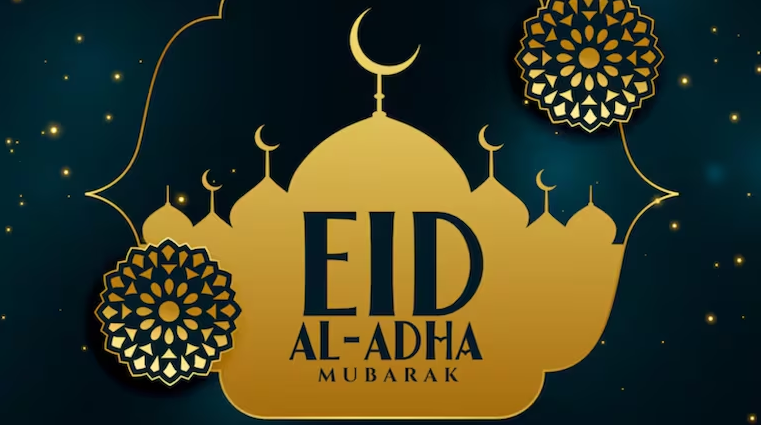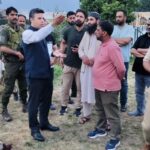Today, the festival, Eid-ul-Adha, will be celebrated throughout the UT. It is one of the most celebrated festivals in Jammu and Kashmir as thousands of people offer sacrifice on this revered day. On this day people perform their religious duties, which include the special prayers (Eid prayers) in which a large number of people participate with religious fervor. Leaving aside the feasts and fiestas, the day is also meant to bring peace and conciliation. Rich traditions associated with the day no doubt heighten the sense of belongingness and community feelings.
This celebration, known as the “Festival of Sacrifice,” commemorates the Prophet Ibrahim’s (AS) unwavering faith and willingness to sacrifice his son in obedience to God’s command. This powerful story, transcending religious boundaries, holds profound lessons that resonate deeply in our contemporary world.
At its core, Eid-ul-Adha is a testament to the virtues of sacrifice and selflessness. In a world increasingly driven by individualism and materialism, the act of giving up something precious for the greater good serves as a poignant reminder of our shared humanity. The ritual of Qurbani, where livestock is sacrificed, symbolizes not just the historical event but the ongoing commitment to these values. The meat from the sacrifice is distributed among family, friends, and those in need, ensuring that everyone, regardless of their socio-economic status, partakes in the festive meal. This practice underlines the importance of community, generosity, and caring for the less fortunate.
Beyond the ritual, Eid-ul-Adha calls for introspection and moral accountability. It encourages individuals to examine their own lives and question what sacrifices they can make for the welfare of others. Whether it’s time, resources, or simply a helping hand, the spirit of Eid urges us to prioritize collective well-being over personal gain. This message is particularly pertinent today as we navigate global challenges such as poverty, inequality, and the ongoing repercussions of the pandemic
Moreover, Eid-ul-Adha is a celebration of faith and resilience. The story of Prophet Ibrahim (AS) is one of trust in divine wisdom and the courage to follow through with difficult choices. In an era marked by uncertainty and rapid change, this narrative inspires us to maintain faith in our values and principles, even when faced with daunting obstacles. It is a call to uphold integrity and compassion, fostering a world where trust and mutual respect prevail
On this special occasion people and families separated by daily occupations get an occasion to sit together and share some moments. On the auspicious day, we put on our best clothes and offer congregational Eid prayers. We exchange Eid greetings with our friends, relatives and neighbors. We relish the different delicacies prepared especially for the happy occasion. However, amid the celebrations, we tend to miss the true spirit of Eid.
While it is indeed a day of happiness it must also be a day of introspection for us. In many places the tradition of enquiring about neighbors and providing for weaker sections and destitute makes this festival propitious. Eid as such is for entire community or society and not for an individual.
While in most parts of world on festivals and community occasions it is common trend to offer rebates. As a goodwill measure and because of strong sense of community feelings, businessmen and traders on these occasions do not think about profits alone. The trend has a positive effect overall as people tend to spend and buy more. In many parts of India people sometimes wait for months for festival days to arrive and then go for shopping. Festivals are the times when people spend generously, however, that don’t mean they should be cheated.
But unfortunately in our UT we see festivals as the means to exploit commoners to the hilt. On the occasions like Eid, many shopkeepers try to earn huge profits by selling substandard essential commodities at exorbitant rates. Even daily commodities are sold at high prices. It is the job of the administration and market check squads to maintain the standards of quality, to ensure that the general people aren’t cheated and prevent adulteration of food items so that people are not exploited.
As we celebrate Eid ul-Adha, let us embrace its timeless message. Beyond the festivities and family gatherings, let this occasion remind us of the power of sacrifice, the importance of community, and the strength found in faith. By embodying these principles, we can work towards a more compassionate and just society, where the spirit of Eid-ul-Adha lives on throughout the year.
The occasions like Eid are rare; they are not moments to fleece people but to benefit them. The true spirit of Eid is to be mindful of those people who are less fortunate among us. We wish for an Eid-ul-Adha, one that brings peace and happiness to all of us.
(Author is PhD in Islamic Studies working in UAE and a columnist)








